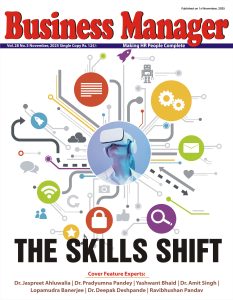The Story of Maya and the Gen Z Innovators
Maya is the VP of Product at a global tech firm. She recently inherited a team half‑filled with Gen Z hires who are truly talented, digitally savvy, and mission-driven, but often quiet in meetings, hesitant to speak up, and seeking clarity about their impact.
At first, Maya felt they were disengaged and difficult-until she decided on a different approach: emotional intelligence (EI).
One Monday morning, instead of critiquing their silence, she opened with: “What would make working on this product meaningful for you?” Heads lifted. One junior engineer admitted, “I want to see how this connects to sustainability because that is my purpose.” A designer asked for more one‑on‑one direction. Their shift was immediate: energy surged, ideas flowed.
Also read – How Design Thinking Drives Innovation in Human-AI Collaboration : Harpreet Kaur Kapoor
Three months later, the team developed a feature that tracked carbon impact. Not only was engagement up, but early feedback praised the feature for its clear purpose,which was built by a Gen Z team that felt heard, understood, and genuinely motivated.
Why Emotional Intelligence Matters: Especially for Gen Z
- Gen Z Craves Empathy and Purpose
Gen Z ranks empathy as the second-most important trait in leaders, far outpacing older generations posterity.in+1hrme.economictimes.indiatimes.com+1en.wikipedia.org+5wired.com+5kornferry.com+5forbes.com+1forbes.com+1. Forbes reports these young professionals seek “human-centered, transparent leadership” and won’t stay for performative gestures forbes.com.
- EI Builds Trust and Retention
A 2024 Harvard Business School Online survey found that 71% of employers value EI over technical skills online.hbs.edu+1icatalyze.org+1. And leaders who use EI strategies, like emotional check-ins, see up to a 25% productivity boost and lower burnout en.wikipedia.org+15blogs.psico-smart.com+15kornferry.com+15.
- Emotional Events Drive Behaviour
According to Affective Events Theory, daily emotional experiences at work shape Gen Z’s satisfaction and commitment harvardbusiness.org+3en.wikipedia.org+3en.wikipedia.org+3. Maya’s one-on-one that Monday was a positive event, enough to shift the team’s mood and output.
The Psychology Behind It
Here’s how classic psychology connects to leading Gen Z:
- Daniel Goleman’s Five Components of EI (1995):
- Self-awareness
- Self-regulation
- Motivation
- Empathy
- Social skills hrreview.co.uk+6kornferry.com+6mindletic.com+6
Maya showed empathy and social skills right away by asking about what mattered to her team and listening actively.
- Affective Events Theory (Weiss & Cropanzano, 1996):
Emotions triggered by work events have a real impact on satisfaction and performance harvardbusiness.org+15en.wikipedia.org+15en.wikipedia.org+15en.wikipedia.org. Maya’s open question had ripple effects beyond that morning. - Empathy Theory:
Empathy enables leaders to “mentally simulate” another’s perspective, fostering richer relationships and stronger trust hrme.economictimes.indiatimes.com+2en.wikipedia.org+2kornferry.com+2. Maya literally walked a mile in her team’s shoes by trying to understand their values and motivations.
Practical Leadership Actions to Engage Gen Z
To emulate Maya’s success with emotional intelligence:

Leading With Belief, Not Control
Gen Z is not a nuisance. They’re the smartest, most emotionally aware generation yet, digital natives with fresh values. But they need to feel the value and see their impact.
When leaders treat them as partners, not cogs, and connect emotionally. They unlock creativity, loyalty, and exceptional performance.
Final Thoughts
By leveraging emotional intelligence, you build a workplace where Gen Z feels valued and purposeful. As Maya discovered, one conversation can spark lasting transformation.
For modern leaders: your technical skills got you here. But emotional intelligence is the ability to connect, empathize, and inspire. That is what will help you harness the brilliance of Gen Z.
Lead with heart. They’ll follow.
References
- Harvard Business School: “Why Emotional Intelligence Is Important in Leadership” kornferry.com+8posterity.in+8icatalyze.org+8en.wikipedia.org+15online.hbs.edu+15kornferry.com+15
- Forbes: “Gen Z and the Empathy Expectation…”forbes.com
- Korn Ferry and Daniel Goleman: “To Lead Gen Zers, Emotional Intelligence Matters…”kornferry.com
- Weiss & Cropanzano: Affective Events Theory en.wikipedia.org+1en.wikipedia.org+1
- Mayer & Salovey / Goleman emotional intelligence model verywellmind.com+2en.wikipedia.org+2online.hbs.edu+2
- Harvard‑backed emotional check‑ins productivity study blogs.psico-smart.com
Stay connected with us on social media platforms for instant updates click here to join our LinkedIn, Twitter & Facebook









